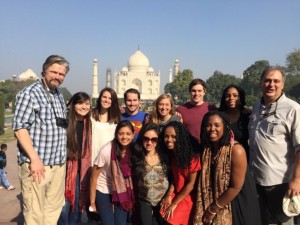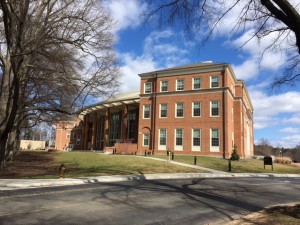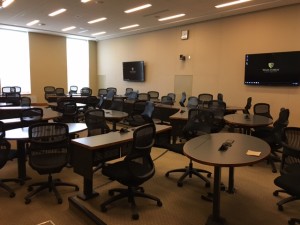Every day at 5 pm, Wait Chapel’s 48 bronze bells ring across campus, sounding anything from Tchaikovsky’s Waltz from Sleeping Beauty to ‘What a Wonderful World’ to Pirates of the Caribbean‘s ‘He’s a Pirate.’ The bells can be heard from just about anywhere on campus. What most people do not know is that there is a man behind the bells, and that man is Ray Ebert.
Ray Ebert, who graduated from Wake Forest in 1960, has been playing the bells, or the carillon, for over twenty years and the pipe organ for even longer.
“I came here to be a math major,” said Ebert. “And then I saw the big pipe organ downstairs, and I spent the rest of my life playing it.”
On top of playing the Chapel’s carillon, Ebert, who is semi-retired, still works as an organist for churches in Winston-Salem and accompanies dance classes and rehearsals for Wake Forest’s dance department and at UNC School of the Arts. Ebert also gives carillon lessons to several Wake Forest students.
“We call ourselves the Carillon Club. There are about eight or so of us. When we come together, like on Love Feast, and we’re all taking turns playing, it’s a real bonding experience.”
“Here,” Ebert said as he pointed to a picture of himself and four Wake Forest students taped to the wall, “We are playing what one student called a waterfall, where you play down the keyboard and then the next person starts and keeps going.”
Ebert, standing next to the keyboard of the carillon and the practice keyboard, made his hands into fists and demonstrated. This newly climate-controlled room, one floor beneath the bells themselves, lies 170 steps from the ground floor of the Chapel. (Ebert counted when the elevator broke temporarily last week.)
Ebert often lets his students play the carillon, especially when their lesson wraps up near 5 pm, he explained. He also lets them play after sports victories and recently made a tradition of letting one of the seniors play at commencement.
“It can be kind of scary. Let’s say they hit G sharp,” he sang, “and it goes a little too long. Well, then it’s too late. G sharp is all over campus,” Ebert said with a laugh.
The Carillon Club, Ebert explained, now takes song requests from their Facebook page, “The Wake Forest University Carillon.” But when asked his favorite piece to play on the carillon, Ebert pulled out sheet music for a song called “Fantasia on a Theme of Wake Forest,” written by Ryan D. Whittington.
“One of my students, who was majoring in music, wrote this song, a duet. It’s only four notes. They spell ‘W-A-K-E,'” said Ebert as he pulled out a chart of handwritten music notes. “Here’s the way you figure it out. Here’s the music scale, A through G, if you align the rest of the letters underneath, W would be B, then A, K is D, and then E. B-A-D-E.”
Ebert, who is from a Moravian family heavily influenced by music traditions, began playing the piano when he was five years-old, but did not start playing for dance classes until much later in life.
“One day, this person called and said, ‘The School of the Arts needs someone to play for dance classes.’ I was young and foolish. Have you ever heard someone who just started to play for ballet class and doesn’t know what to do? Well, it’s awkward,” Ebert laughed. “Now, I can. I have a lot of things in my memory, but I can also improvise, just making up the tune on the spot.”
One of the classes Ebert plays for every week is Wake Forest’s advanced classical ballet class. The class is taught by Brantly Shapiro, who enjoys the live accompaniment.
“For one thing, ballet is a musical art, and the musicality element is huge in terms of getting proficient in ballet. When you have live accompaniment, the big difference for the teacher is you set the combinations and then someone accompanies that. And if you have a good musician, they come up with a flavor of music that matches. The other thing is the rapport with the musician. He’s not just stuck in the corner. He’s a part of what you’re learning,” said Shapiro.
Many of Shapiro’s students agreed that Ebert is a big part of their class.
“The music he plays is beautiful and diverse,” said freshman Emma Scott. “He also warns us when he’s going to play music from a ballet on the bells that evening.”
Ebert explained playing for dance classes is just as satisfying as playing the carillon and teaching students to play the carillon. As he nears 80 years-old, Ebert claims he has no plans to stop playing.
“Ray has been playing for ballet classes as long as I have been here, 33 years. He has been a big part of the Winston-Salem music scene as long as I can remember too,” said Shapiro. “He’s a fixture.”








